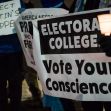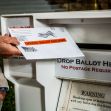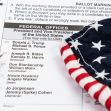Presidential elections in the United States use a system referred to as the Electoral College. Under this system, elections are not determined based on which candidate received the most votes, but rather on which candidate secured the largest number of Electoral College votes. Each state is assigned a certain number of electors, totaling 538. The Constitution of the United States established the system as a form of compromise between different factions of framers and the states they represented.
Electors are intended to represent the will of the voters and typically pledge to vote in line with the candidate elected by the people. However, these electors are the ones to fill out the ballot, and in some rare cases, they go rogue and place a vote for someone other than the person elected by their party. These voters are referred to as “faithless electors.” In 2016, ten electors deviated from their party’s candidate and entered votes for another person. Some of those electors were penalized for their decisions, leading to a lawsuit that recently made its way to the Supreme Court. In a unanimous ruling, the court found that such sanctions are proper. Even with such sanctions, we could still see deviant votes again in November.
History of the Electoral College
When the framers drafted the Constitution, they were facing several concerns regarding how to establish a fair and effective election, while also addressing fears over the possible influence of uninformed voters. Many were concerned that heavily populated states would decide elections, and policies would benefit those citizens over others. In effect, states with large cities would sway elections at the expense of more rural states. While there were proposals to establish a system based purely on the popular vote, there were others who thought Congress should be tasked with electing the president. In the end, the Electoral College became a form of compromise between competing concerns of these various factions.
Under the system, each state has a minimum of three electors. More populous states are allocated additional electors. One vote is granted for every member of Congress (435 for the House, and 100 for the Senate).
The system allocates California, which boasts the nation’s largest population, 55 electoral votes. At the other end of the spectrum, there are six states with only three votes. The District of Columbia also gets three votes, making the total number of electors 538.
The Census, which occurs once a decade, can lead to the reallocation of representatives and electors. In this way, the system accounts for changes in state populations over time.
States create some of their own rules for electors. Not all states require that the electors follow the results of the election, but some states penalize electors if they cast their vote for a candidate other than the person selected by the party and voters.
Faithless Electors Challenge Penalties
While ten faithless electors may not sound like so many, it is one of the highest numbers ever
recorded. One particular outlier election occurred in 1872 when one of the candidates died during the election, leading to a particularly high number of votes that were technically faithless as they were not cast for the deceased candidate.
In 2016, faithless electors cast ballots for Bernie Sanders, Colin Powell, John Kasich, Ron Paul, and Faith Spotted Eagle. In the end, they did not sway the election, but simply served as a form of protest against the selected candidates.
In response to their decision not to vote for the elected candidate, some of these electors were fined and penalized. In Washington and Colorado, faithless electors were fined $1,000 and removed from their posts. The Washington Supreme Court ruled eight to one to uphold the penalties. The one dissenting judge argued that the state’s authority was to appoint the elector, but that the elector has the right to vote according to his or her conscience. In Colorado, a divided three-judge panel ruled that the electors have the right to cast their votes as they see fit.
With the lower courts divided, the challenge against faithless elector penalties made its way to the Supreme Court. The highest court of the land shot down the challenge against fines and penalties in a unanimous decision.
It is now clear that the penalties against faithless electors can stand. However, such fines may do little to deter such future acts of protest.
Can Faithless Electors Sway an Election?
What if so many electors refuse to vote with their party that they change the outcome of the election? In the unlikely but possible event that faithless electors sway a presidential election, there are two ways that federal lawmakers could respond. Congress must decide following an election whether electors’ votes were “regularly given.” In most cases, this process is a formality without any controversy. In an unprecedented situation in which faithless electors impacted the outcome of the election, any member of Congress could object to the results. The members of the House and the Senate would then have to vote on what to do about the faithless elector votes. If the House and Senate have different opinions, the decision is up to the Secretary of State in the state where the elector or electors cast the faithless votes.
The Constitution also provides that if the result of an Electoral College vote ends in a tie, the House selects the president. The choice of vice president is up to the Senate to determine.
Impact on 2020’s Election
The decision to cast a faithless vote might not matter beyond its statement as a protest. However, a small margin of votes has made a difference in past elections. In 2000, George W. Bush won by only five electoral votes. Ultimately, it is unlikely that a decision based on faithless votes would stand, and it would certainly create plenty of controversy and confusion regardless.






